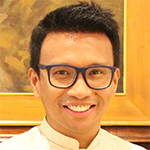

In our society forgiveness is often described in two ways.
The first is that it is a religious duty. It is the right thing to do because God Himself forgives. To forgive in this sense is to set the other person free.
The second is more limited. It is an introspective act. To forgive is not for the other person. Instead, to forgive is to set oneself free from any emotional baggage.
Either way, forgiveness is framed as a personal decision and a matter of the heart. Characterizing forgiveness in this manner can be helpful especially for people who struggle with bitterness.
But it also has its own problems. It places an unnecessary burden on the wronged individual.
A private matter?
To render forgiveness in those terms fails to recognize that offense is not just a private matter. Offense – that which calls for forgiveness – takes place between people.
In other words, framing forgiveness as an introspective moment fails to recognize that pain is not an isolated moment to begin with.
Suffering is caused by people against other people. It can be in the context of an extramarital affair or, on a much larger scale, social injustice when the rich take advantage of the poor.
At the same time it is important to recognize that violence breeds on uneven relationships in which the privileged exploits the weak. For sociologists, all forms of violence – from symbolic to structural – emanate from this asymmetry.
In this light, to seek forgiveness without calling for justice is a dangerous mistake. Forgiveness must demand justice.
Justice
There are many definitions of justice depending on the context. But at its core, justice is the administration of fairness. Fairness calls for the correction of wrongdoing, the reparation of offense, and even the restoration of the offender.
At the same time, justice is needed not only to rectify the mistakes of the past. Its higher cause is to end the violence that takes advantage of other people's vulnerabilities.
What then is the relationship between justice and forgiveness?
Justice arrests abuse. Forgiveness tempers vengefulness.
Put differently, while forgiveness is an individual decision, justice is a social responsibility. That they go hand in hand acknowledges that abuse and vengeance feed off each other in an endless cycle of violence.
When done well, forgiveness and justice can transform not just individuals but society at large. Here’s how: Both demand that perpetrators acknowledge their wrongdoings, that citizens recognize victims’ suffering, and that the state upholds human rights. This is the point that the peacebuilding scholar Daniel Philpott makes about the “justice of forgiveness”.
To assume that one is greater than the other is a mistake. Other people also wrongly assume that they are mutually exclusive. So they call for forgiveness without calling for justice.
Forgiveness without justice is not only irresponsible. It is in itself unjust.
Moving on
In our dominant religious culture, to forgive is a celebrated virtue.
But there is a danger in valorizing forgiveness. It becomes exploitative.
Suspicious therefore are those who seek forgiveness but are unwilling to speak of justice. Think about betrayal between friends, violence in the household, and every other injustice made against the vulnerable. Too often their victims are not only blamed for what they experienced. They are also asked to forgive.
Think about it too: The revisionist project of the Marcoses is couched in a language of forgiveness. They insist that we should all move on. And yet it is so difficult for people like Bongbong Marcos to apologize.
They valorize moving on. They desire forgiveness. But they do not wish to admit their moral culpability. In effect they want a free pass for the abuses of their family.
Unfortunately, that is where we already are. The revisionist project has gained traction. Imee Marcos, who will soon run for senator, wants all of us to move on.
Demand justice
But all is not lost. The key is to remind ourselves and our children that forgiveness demands justice.
To forgive, while a religious duty, should not come easy when a greater good is at stake.
In an episode of Netflix’s The Crown, the Duke of Windsor accuses the young Queen Elizabeth of inhumanity for not forgiving him. German records (called The Marburg Files) exposed the Duke’s complicity with Hitler. If their plans succeeded, the Duke, who previously abdicated the Crown, would be reinstated as King of England in exchange for German access across Europe. The plan did not succeed, but the complicity was undeniable.
The Queen fires back: “There is no possibility of my forgiving you. The question is: How on Earth can you forgive yourself?”
It is a question that not only the Marcoses have to ask themselves. In these times when we are all complicit to the injustices in our midst, it is a question that we all need to ask ourselves too. – Rappler.com
Jayeel Cornelio, PhD is Associate Professor and the Director of the Development Studies Program, Ateneo de Manila University. A sociologist, he is among the 2017 Outstanding Young Scientists of the Philippines. Follow him on Twitter @jayeel_cornelio.